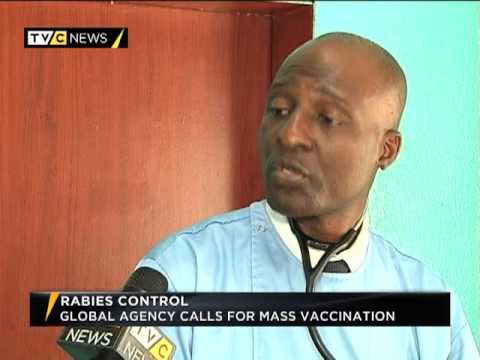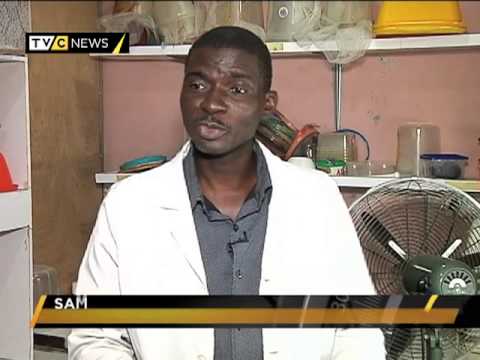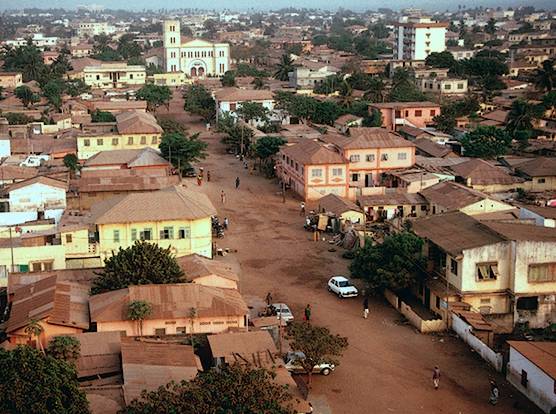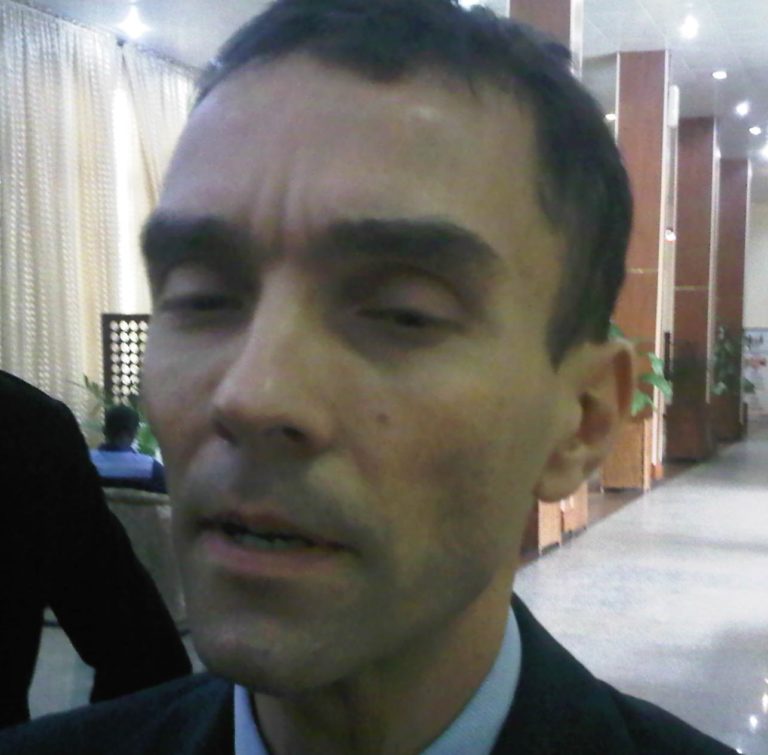Video: Malaria control in Nigeria
The World Health Organisation WHO says Africa is home to moe than 80% of malaria infections and deaths in the world.
Despite the success of a recent malaria vaccine, Africans will have to wait for years before the vaccine becomes publicly available
My report is focused on prevention and control of the spread of malaria as a key solution in Nigeria.
Watch video
Fresh revelations on Shell pollution in Nigeria
The lawyers of four Nigerian farmers and Friends of the Earth Netherlands, who are pressing charges against Shell over the oil pollution in three villages in the Niger Delta, have obtained confidential records that shed new light on the working methods of the Shell oil company.
 On the basis of these documents, the lawyers are again asking the court in The Hague for access to additional internal Shell documents, which they want to use to prove that Shell head office in The Hague is liable for the oil leaks that have been occurring in the Nigerian villages. In September 2011, a similar request for access was turned down by the courts.
On the basis of these documents, the lawyers are again asking the court in The Hague for access to additional internal Shell documents, which they want to use to prove that Shell head office in The Hague is liable for the oil leaks that have been occurring in the Nigerian villages. In September 2011, a similar request for access was turned down by the courts.
The lawyers have obtained the Design and Engineering Practice documents, written by Shell in the Netherlands. These documents describe in detail how subsidiaries of Shell Netherlands are to build and maintain their facilities in other countries, such as Nigeria.
Geert Ritsema, campaign leader of Energy & Natural Resources at Friends of the Earth Netherlands, said: “Up to this point, Royal Dutch Shell (RDS), the Shell head office in the Netherlands, has maintained that its operating companies across the world all work under their own authority and that therefore the head office cannot be held liable for any damage brought about by the actions of its subsidiaries. These documents prove that Shell oil company is actually a meticulously managed company. Shell Nigeria works according to guidelines as established by the headquarters in the Netherlands. That means that if damage has been wrought in Nigeria – and there is no doubt that it has – the head office here is responsible.”
In January of this year, the court in The Hague delivered its first verdict in the case filed by Friends of the Earth and the four farmers. The Shell subsidiary in Nigeria has been found guilty of oil pollution in one of the three villages being cited in the case. The company must compensate farmer Friday Elder Akpan from Ikot Ada Udo for the pollution of his land. Shell appealed against this verdict. The court judged there was insufficient proof of Shell’s culpability regarding the leaks from Shell pipelines in the other two villages. Additionally the court ruled that the Shell head office in The Hague can in no way be held accountable for the leakages from the pipelines in the Niger Delta. Friends of the Earth and the farmers appealed against these two verdicts in May.
The new request for access to documents, being submitted by the lawyers of Friends of the Earth and the Nigerians, is the first step of this appeal. The lawyers think that with the new documents in hand they will be able to prove that the plaintiffs have legitimate interest in acquiring access to other internal records of Shell. These could then be used to provide further evidence of the liability of the Shell head office. In September 2011, the court denied a similar request for access. Once the court has ruled on the request for access, the second stage of the appeal will commence. The first sitting in the appeal case is expected in early 2014.
Friends of the Earth and the Nigerians challenged Shell in The Hague court in May 2008. The court case is unique because it is the first time that a Dutch multinational is being challenged in a court in its own country for environmental damage inflicted in another country. Friends of the Earth and the farmers are suing Shell Nigeria (Shell Petroleum Development Company of Nigeria – SPDC, a Shell subsidiary) as well as the Dutch parent company/multinational Royal Dutch Shell for oil pollution in three villages in the Niger Delta: Goi, Oruma and Ikot Ada Udo. Their demand is that Shell cleans up the oil pollution in the villages, compensates the farmers for damages suffered and ensures better maintenance of the oil pipelines.
Geert Ritsema added: “Meanwhile, the plaintiffs are still living with the consequences of the leaks. In Ikot Ada Udo, Friday Elder Akpan is waiting for compensation, in Goi the people are still living surrounded by sticky black oil residue and in Oruma fishing in the creeks polluted by Shell oil is still impossible. New leaks are still occurring on a daily basis in the Delta because Shell is not taking its responsibility. This is impossible to accept for the people living there.”
Meanwhile, compensation talks have begun in Nigeria between lawyers for Royal Dutch Shell and for 15,000 Nigerian villagers who say their livelihoods were destroyed by oil spills from pipelines operated by the company.
The Nigerians launched a suit against Shell at the High Court in London in March 2012, seeking millions of dollars in compensation for two oil spills in 2008 that polluted the waterways of the Bodo fishing communities in the Niger Delta.
The legal action is being closely watched by the industry and by environmentalists for precedents that could have an impact on other big pollution claims against oil majors.
A vast maze of mangrove swamps and creeks, the Niger Delta is home to communities of subsistence farmers and fishermen living alongside the multi-billion-dollar oil industry.
Oilwatch to Ecuadorian president: Keep oil firms out of Yasuni-ITT
President of the Republic of Ecuador, Rafael Correa, has been urged by Oilwatch International not to permit the extraction of crude oil from Yasuni-ITT in order to protect the region from environmental damage.
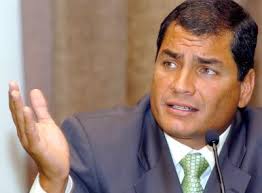
In a recent correspondent to Correa, the environment watchdog group told the president to stand firm and continue to show leadership in the area of sound environmental management.
The letter reads:
“We are shocked by the announcement you made on 15 August 2013 that you would permit crude oil extraction in the Yasuni-ITT. We strongly believe that the original decision to leave the oil in this pristine territory in the ground was the right decision and that the decision should not be revised or changed for any reason. We hereby declare our support for the original initiative to refrain from exploitation of the heavy crude oil of Yasuni-ITT.
“Ecuador has shown leadership in many ways, including by recognising the rights of nature (in your 2008 constitution), the Yasuni-ITT initiative and in generally broadening the space for freedom and democracy in the world today. This is the way the most of the world sees Ecuador.
“The single step of opening up Yasuni-ITT to national or international oil companies erases the positive image that your dear country has built with a single stroke. By allowing oil extraction in Yasuni-ITT you would be negating the rights of the indigenous people in the territory who have elected to live in voluntary isolation. Secondly you would be closing the democratic space and declining to listen to the voice of millions of Ecuadorians who have bravely voiced their dissent to your unpopular move. Thirdly, opening up Yasuni-ITT will counter your constitutionally declared rights of nature. Crude oil extraction is by no means a benign activity and the deep scars left by Texaco (Chevron) in the oil fields of Ecuador are a stark reminder that steps must be taken to heal the earth and not to inflict more harm on her.
“Finally, we call on you, Mr President, to ignore the fact that the world did not rush in with the cash you demanded in exchange for keeping the oil untapped. Accept from us that your move had inspired many peoples around the world to demand an end to expansion of fossil fuels extraction, especially into fragile eco-systems. Today, Yasunisation has come to mean the preservation of the integrity of Mother Earth from the ravages of insatiable oil companies and governments by leaving fossils underground.
“Money cannot pay for the gains that the Yasuni-ITT position has given Ecuador and the world. We affirm that the rights of the people of Yasuni and the rights of nature deserve to be respected and defended and that the oil in Yasuni-ITT should be left untapped. And we urge you and the Assembly of Ecuador to do likewise.
“Moreover, Mr. President, we urge you to order a halt to the repression of young people who are standing in support of life and Yasuni!”
The letter was endorsed by: Noble Wadzah – Ghana (Oilwatch Africa), Siziwe Khanyile – South Africa (Oilwatch Africa), Clemente Bautista – Philippines (Oilwatch South East Asia), Faikham Harnnarong – Thailand (Oilwatch South East Asia), Tom Goldtooth – USA (Indigenous Environmental Network), Winnie Overbeek – Uruguay (World Rainforest Movement) and Nnimmo Bassey – Nigeria (Health of Mother Earth Foundation/Oilwatch International).
Unveiling a new global low-carbon spirit
In a recent blog, Executive Secretary of the United Nations Framework Convention on Climate Change (UNFCCC), Christiana Figueres, sums up highlights of a new low-carbon pioneering spirit, made all the more urgent by increasing climate change impacts
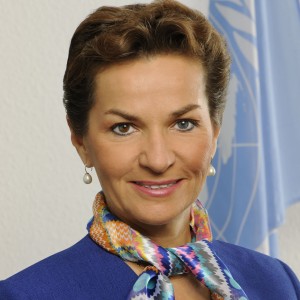
Last month, I did some holiday reading and was inspired by Amy Larkin’s account of how the world in general – and businesses in particular – has run up enormous amounts of environmental debt over the years. Her book is also about the private sector waking up to the opportunities posed by climate change, and how governments need to play a crucial role in catalysing climate action. I agree that the right signals from policymakers help create a new generation of low-carbon pioneers. This trend urgently needs to accelerate, in the truest sense of the word.
Part of the world’s accumulated environmental debt mentioned by Amy Larkin in her book came due in August, in the form of yet more extreme weather. According to the 2012 State of the Climate report from the US National Oceanic and Atmospheric Administration published last month, the last decade was among the warmest on record, and the warming trend continues unabated. Unusually hot, dry weather in Alaska wreaked havoc on fisheries, with thousands of fish dying in overheated waters. In China, extreme drought left nearly six million people short of water, causing economic losses in the billions. And, a new World Bank study puts the estimated cost of flood damage to global cities at $1 trillion a year by 2050. So the costs are only set to grow if we do not act. With a growing global urban population, cities across the world have much to lose.
Thankfully, there are signs that decision-makers in boardrooms around the world are indeed rethinking their business models. A new report published in August finds fund managers in charge of investments worth $14 trillion are taking climate change into account when making decisions, and would be willing to do a lot more if they received the appropriate signals from policymakers.
I was encouraged by the good news in August of how renewable energy continues to gain traction around the globe, notably in countries with strong incentives and policies. Germany succeeded in shattering its solar generation record. The country now leads the world in per capita solar capacity, quite an achievement for a northern country that gets as much sunlight as Alaska! If record amounts of solar power can be produced under grey skies, then the potential for countries with sunnier weather is almost limitless. The African continent is a prime example of this untapped potential, with South Africa setting the pace for clean energy investment across the continent. And in a further boost for solar, a recent report by analysts from the Deutsche Bank says that 75% of the global solar market will soon need little or no subsidy.
Tapping away on my computer to write this, I am heartened by the good news from the IT sector about the growing use of renewable energy by computer server farms.
Clearly this is all positive news, but we need to move ahead faster and more efficiently into a low carbon world. And we need to do that quite literally.
August saw the emergence of several impressive sustainable transport innovations that stand to benefit communities and change the investment landscape.In South Korea, the Online Electric Vehicle, or OLEV, electric bus can charge while in transit. This reduces emissions and associated pollution, while reducing operating costs.
In Copenhagen, where 52% of citizens commute by bike every day, residents and visitors can get around more easily with an innovative bike sharing program that includes built-in GPS to connect bikes and rail transit. I myself enjoy my daily bike commute along the Rhein – it’s an excellent way to stay fit and healthy, while reducing emissions!
Perhaps more relevant for those who need to travel long distances quickly, and a good example of pioneering thinking, entrepreneur Elon Musk has revealed an “open source” vision of 21st century intercity travel with the near-supersonic “Hyperloop” that would link San Francisco and Los Angeles in a 30 minute trip that generates more energy than it uses. These examples represent a rethinking of transportation that is an insight into today’s innovative low-carbon possibilities.
In my last blog, I wrote about the daring journey of the solar impulse plane that flew across the US from LA to New York. Bertrand Piccard, pilot of the solar impulse, says that “Pioneering spirit should continue, not to conquer the planet or space … but rather to improve the quality of life.” I agree with Bertrand Piccard and say that the key to improving our quality of life comes to a large degree with the power of innovative low-carbon solutions.
Stockholm forum explores ways to build water partnerships
Scientists, non-profit organisations and policymakers all over the world convene this week at the Stockholm International Water Institute in Sweden for this year’s World Water Week (WWW) to discuss new research and developments in water conservation – and most importantly, what needs to be done to ensure the protection of one of earth’s most valuable resources for future generations.

In line with the U.N. General Assembly’s declaration of 2013 as the International Year of Water Cooperation, the WWW 2013 theme is Water Cooperation: Building Partnerships.
According to a recent estimate by the World Health Organisation (WHO) and the U.N. Children’s Fund (UNICEF) Joint Monitoring Programme (JMP) for Water Supply and Sanitation, 768 million people do not have access to clean water, and two and a half billion people do not have access to adequate sanitation facilities. Contaminated water plays a significant role in malnutrition – vomiting and diarrhoea caused by water-borne diseases prevent the absorption of key nutrients in food, and are responsible for the deaths of approximately 1.3 million children every year.
Meanwhile, crops that are nourished with contaminated water can carry dangerous pollutants, such mercury and arsenic, which can inhibit crop growth and potentially sicken people who consume the crops. Unfortunately, agriculture is not only a primary contributor to global water use – approximately 70 percent of the world’s water use is concentrated in farming – but also to water contamination. U.N. Water estimates that the food sector contributes 40 percent of organic water pollutants in industrialised countries, and 54 percent in developing countries. And the Barilla Center for Food & Nutrition reports that if everyone in the world had the same consumption habits as North Americans and Europeans, a 75 percent increase in water resources would be necessary to sustain them.
During the WWW, Food Tank will also highlight research and innovations that are working around the world to conserve water resources and make clean water available to everyone.
But most importantly, these should serve as inspiration for cooperation. Research institutions, private businesses, governments, and the donor community can all work together to:
- research simple innovations for providing clean water to households. There are already several low-cost, simple innovations that are available to households in areas with limited access to clean water.
For example, SODIS is a method of solar water purification by which untreated water is placed in transparent bottles and heated and disinfected by UV rays. Charcoal filters and biosand filters can also remove impurities and pathogens from water. The organisation ECHO is training development workers to construct low-cost biosand filtration systems. However, further research and funding needs to be directed toward similar methods for at-home water purification.
- Build infrastructure for communities. Giving communities the means to access water for personal consumption and for agriculture is a crucial step in global development. In Niger, theInternational Crops Research Institute for the Semi-Arid Tropics (ICRISAT) has constructed solar drip irrigation systems for market gardens. Their model has been replicated by other organizations, such as the Solar Electric Light Fund (SELF), which implemented a similar system in a women’s farming cooperative in Benin. Drilled wells, although expensive to implement, are useful in helping communities access underground aquifers. Governments and nonprofits, such as The Water Project, primarily fund construction of this infrastructure, but there are also opportunities for the private sector to contribute. For example, People Water is a for-profit company, and its Drop for Drop program puts money from bottled water sales toward building and maintaining drilled wells in Haiti, India, and other developing regions.
- Mainstream organic agriculture. Chemical fertilizers, pesticides, and antibiotics in animal waste all contribute to water pollution, causing health problems for eaters and damaging the environment. Water runoff from land treated with chemicals can contaminate water supplies. By implementing organic fertilizers, agro-ecological pest-management methods, and raising livestock holistically and without antibiotics, farmers can prevent contamination of already scarce water supplies.
- Implement low-resource farming practices. For centuries, farmers across the world have used traditional methods that conserve water. As population demands on agriculture increase, global agricultural water consumption is expected to increase by 19 percent by 2050, indicating a need to expand on water-conserving farming methods. Both new techniques – such as solar-powered drip irrigation methods in Benin – and old – such as zai, an effective form of rainwater harvesting in Burkina Faso, should serve to inform the future of farming.
Lome Convention devises climate, post-2015 MDGs agenda
Recently, representatives of civil society organisations (CSOs) from West African nations such as Nigeria, Ghana, Liberia, Sierra Leone, The Gambia, Togo, Mali, Cote D’Ivoire, Benin, Niger, Burkina Faso, Guinea and Mauritania converged on Lome, Togo for the West Africa Regional civil society capacity building workshop on Climate Change and Post 2015 MDGs Sustainable Development Agenda organised by the Pan African Climate Justice Alliance (PACJA), in collaboration with the Fellowship of Christian Councils and Churches in West Africa (FECCIWA). The forum had “Climate Change and Post 2015 MDGs Sustainable Development Agenda” as its theme.
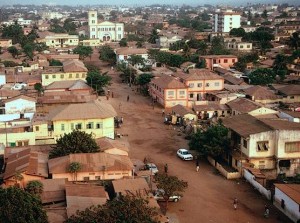
Participants at the two-day event observed in “Lome Convention” (a communique released at the close of the gathering) that the impacts of climate change have continued to exert considerable economic, social, political and cultural pressures on households, working families, the poor, rural and urban dwellers. The pressures are said to have a combined effect of reducing opportunities and potentials for attaining progress and prosperity in our communities.
They likewise noted that a wholly transformative development framework is required to fulfil the international commitments of the past and present which, they added, must be based on the principles of human rights, equity, social, economic, gender, climate and environmental justice, participation, accountability and non-discrimination.
While stressing that poverty and inequality are on the increase as a result of the people’s inability to effectively tackle the problems of climate change, they emphasised that certain developed countries are still not fully committed to the Kyoto Protocol.
They insisted that climate change is a human rights issue that cuts across all sectors and must be tackled through a holistic developmental approach. They described the continent’s technical, technological and financial capacities as being too weak to address climate change adaptation issues.
They frowned at the dominance of the private sector across development and its disregard for the principles of environmental sustainability and enforceable international accountability in line with human rights.
They also expressed concern over developed countries’ lack of commitment to reducing greenhouse gas (GHG) emissions, even as higher temperatures are being experienced and the impacts of climate change are being manifested in repeated cases of flooding, aggressive deforestation, desert encroachment, sand dune surge, drought and depletion of arable land.
The need for Africa to begin to focus on generating its own funds in order to finance climate change programmes and activities was underlined by the gathering, which laid emphasis on the importance of continuous training and information sharing so as to deepen the capacities, skills, knowledge and information of stakeholders around climate change issues. They affirmed the authority of the civil society and communities as the expression of the people’s sovereignity.
Consequently, they declared, climate justice and sustainable management of the planet’s resources must be at the centre of the Post 2015 development framework, adding that developed countries must continue to be held to commit and deliver on providing financial and technological resources to address mitigation and adaptation challenges in line with the principle of common but differentiated responsibilities.
They declared that the Beyond 2015 Sustainable Development Agenda should be underpinned by the principle of polluter pays, common but differentiated responsibilities with respective capabilities, equity and climate justice.
All countries, it was agreed, should make a contribution towards the achievement of a more sustainable world with actions based on levels of corruption, low carbon development pathways, abilities to adapt to the effect of climate change, as well as to reduce risks and respond to disasters.
Further, it was resolved that national non-state actors’ platforms on climate change should initiate and implement national action plans that would lead to effective participation and outcomes around Conference of the Parties – COP 19.
West African CSOs were asked to engage their governments to find alternatives to financing climate change such as the adoption of the Financial Transaction Tax (FTT) and taxes on luxury imported goods and services.
African governments, on their part, should increase their funding for climate change projects and activities, while CSOs should increase their efforts to monitor and track climate change budget provisions and performance. Additionally, the activists will monitor and participate effectively in the management and implementation of the Green Climate Fund (GCF), while researching into and exploring ways to achieve practicable sources of cheap and clean renewable energies.
The participants want alternative and sustainable agricultural methods made available to African farmers in order to address the crisis of food insecurity. They urged rural and urban folks to take advantage of the strengths and opportunities in new and emerging social media in order to address climate change challenges affecting the people.
Decision makers were asked to include global governance in the post 2015 development framework by institutionalising democratic participation and accountability to citizens at all levels. The need to give top priority to the promotion of women’s rights, gender equality and the empowerment of youth and vulnerable groups was underscored.
2012 flood: Nigeria adopts disaster recovery plan
Nigerians are not in a hurry to forget the widespread flooding that ravaged a considerable part of the nation in 2012. The disaster was unprecedented in the country’s history. Despite warnings of heavy rains in 2013, the flooding of last year’s magnitude is however yet to manifest.
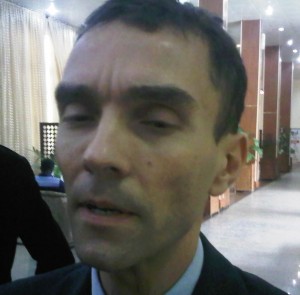
But it was enough to jolt the Federal Government from its reverie and into taking action towards addressing emergencies. The National Disaster Recovery Strategy/Framework and 2012 Flood Recovery Action Plan, as the document is christened, is being prepared in collaboration with the United Nations Development Programme (UNDP) and the World Bank.
After the flooding, government, with support of World Bank/Global Facility for Disaster Reduction and Reconstruction (GFDRR), United Nations Systems, European Union (EU) and other Development Partners conducted a Post Disaster Needs Assessment (PDNA) of 2012 flood disaster from November to December, 2012.
The scope of the PDNA included estimating the effects and impacts of the 2012 floods, estimating the financial requirements to overcome the impact of the disaster through a set of well-defined recovery and reconstruction with disaster- resilience features, and defining a strategy to reduce disaster risk that can be applied in the long term.
The final report of the PDNA was disseminated to all stakeholders, followed by a series of review stakeholders meetings in June 2013, where recommendations contained in the report were reviewed with a view to developing short-term recovery and reconstruction framework, and prioritised actions for future implementation.
As a follow-up to that engagement, stakeholders a week ago converged on Abuja, the federal capital city, to review and validate both the National Disaster Recovery Strategy and Framework and the Nigeria 2012 Floods Recovery Plan.
The UNDP Deputy Country Director in Nigeria, Bernardo Coco, at the forum said the Action Plan was developed with the support of UNDP “as part of a broader strategic response to addressing the broader challenges of disaster management in Nigeria, arising from the lessons learnt from the 2012 floods.”
According to him, UNDP’s partnership with the National Emergency Management Agency (NEMA) predated the 2012 floods, stating that NEMA was supported in the institutional mapping of all ongoing efforts in Disaster Risk Reduction (DRR), the Nigeria Disaster Risk Reduction Capacity Assessment, and development of a National Action Plan for Disaster Risk Reduction.
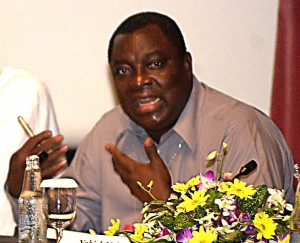
In direct response to the floods however, he said that aside from coordinating the UN systems inputs into the PDNA, it also supported the preliminary humanitarian assessment, undertook a community consultation and validation surveys in partnership with the six Nigerian universities centres for disaster management as a critical part of the human recovery needs assessment (HRNA).
“Consultations are also already ongoing on developing a DRR project, which will be implemented by NEMA,” he said, even as he commended the Director General of NEMA, Sani Sidi, “for his foresight and leadership which has resulted in the development of these strategic documents and to also assure him of UNDP’s continued support in their implementation, going forward.”
A UNDP consultant on the project, Professor Seth Vordzorgbe, noted that the time has come for Nigeria to look at how it can recover from emergencies, adding that the country has a strong framework in terms of policies and institutions, “some of which are not complete but are in the process of being completed, but they need to be operationalised and, one of the areas is how do we recover from disasters when they occur? So, the government requested the assistance of the UNDP to help to develop a recovery framework.”
Vordzorgbe, a Ghanaian, said his impression is that “the timing is good, the enthusiasm is there, the will of government is strong and the way we have a lot of participation from states and other stakeholders that their buying in to the process is strong as well. It bodes well for its implementation if the resources are there.”
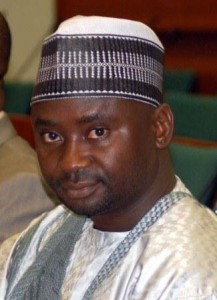
Vordzorgbe said Nigeria is putting an appreciative system in place for response but that it needed to be activated more often and systematically at the various levels. “But the framework does exist. However, there is no concrete integrated framework and there is where the gap lies. This builds on the disaster response plan which was prepared in 2001, which itself needs to be revised because of its complex nature.”
On the timeframe needed to put the action in place, he said when the revalidation stage was over, it would be finalised and that the next step would be its formal approval. “I cannot give you a very definite timeline but there are other things being planned to move this process forward. One of these is that UNDP is developing a project with NEMA to finalise these frameworks, to rationalise them, and to also do a national preparedness framework.”
He said the framework being prepared was for recovery that is very modern “if you compare the countries of the world. This is the first of its kind in Africa and it is modelled on that of the US, the UK, New Zealand and so it is the state-of-the-arts. Even the United States FEMA did its recovery framework in 2011. So, this is the most recent but the question is operationalisation that is the will and the funding to make that happen.”
On funding, he said, “This is not a project at such but a framework that should guide action. So, depending on the disaster and the time it will take to recover. One of the elements in this framework is financing of disaster recovery.”
He said it was not about funding but financing of recovery because “funding limits itself to government funding but financing brings in all the options, including tax concessions, investment allowances. For example, in the last flood when businesses were destroyed in Anambra State and the rest, one of the things that could have been done is to say let’s give physical rebate as a way of giving the business owners come back on track. Perhaps their tax obligations for this year could be cut down, not necessarily waived, and given an extended time to meet them. So, we take a holistic approach to financing disaster management and not just funding.”
In financing flood disaster recovery, he said there is a role for everyone. “They were able to mobilise large sums of money in the Presidential task force. That is one good example and this is about the second time I have heard this was done. The first was in Kenya during the drought of 2011 where civil society and business interest came round to mobilise funding. The private sector here in Nigeria can actually do a lot more.”
Director General of NEMA, Sani Sidi, said the document is being prepared against the backdrop of 2012 unprecedented flood that caused widespread devastation in several states of the country. “To me, that experience serves as a wakeup call for NEMA and her stakeholders to fashion out lasting workable guidelines of operations towards Disaster Risk Reduction and improving our national resilience.”
He said one of the strategic priorities of the agency is to reposition the country by providing a solid foundation and frameworks for building a national and community resilience to reduce all related disaster risks towards actualising the gains of any developmental strides aimed at total transformation for rapid socio-economic development of our great country.
“To achieve this strategic objective therefore, the National Emergency Management Agency (NEMA) has developed various policy frameworks and programme instruments to guide Disaster Risk and Emergency Management,” he said.
NCF, BirdLife in conservation scheme to renew livelihood, habitat
A team of nature conservation groups has embarked on an initiative designed to improve livelihood and habitats of migratory birds in the Sahel areas of Nigeria, Burkina Faso, Senegal and Mauritania.
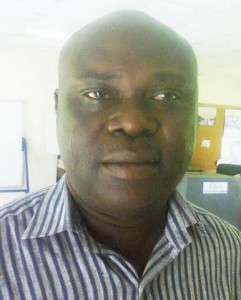
Tagged “Living on the Edge Project (LOTE),” the project is funded by the Dutch Nationale Postcode Loterij, an independent lottery that sets aside two-third of its profits for charities in the fields of development, education and nature conservation. Vogelbescherming Nederland, as the beneficiary of the grant, established a contractual partnership with BirdLife International, Nigerian Conservation Foundation (NCF) and three West African countries to carry out intervention activities aimed at realising the goals and objectives of the project from 2011 to 2015.
Presently, the project is being implemented in seven communities in the Sahel zone of Nigeria. These communities are Kaska, Kumaganam and Meori, in the sand dune-prone area of Yobe State; Adiani, Baturiya and Maikongoli situated within and around the Hadejia-Nguru Wetlands Complex; and Rijiyan Dono in the Sokoto-Rima Basin.
The aims of the project are to: restore and conserve the natural dryland and wetland habitats, improving peoples’ livelihoods and conserve habitats for migratory birds, and empower people for sustainable use of natural resources and improve livelihoods. The project employs various strategies to achieve its set goals which are all encompassing and toeing the line of African Union (AU) policy direction.
Similarly, the Great Green Wall initiative is expected to plant trees that provide a barrier against desert winds, and help to hold moisture in the air and soil, allowing agriculture to flourish. The LOTE takes the cognisance of the fact that forests play a major role in the efforts to arrest climate change. Next to the burning of fossil fuels, deforestation is the greatest source of greenhouse emissions, hence the global demand to stop deforestation and to engage in massive re-afforestation in tropical zones.
The project combines Geographical Information Systems and remote sensing technology to develop LandUse/LandCover map of these areas to identify the area of intervention in each sites and also delineate the habitat restoration sites.
So far, the forest regeneration component of LOTE has restored about 15 hectares of land in some of the communities it works. This is evident in the planting of 14,700 seedlings on 10 hectares of land and provision of 1,500 seedlings of economic trees for the communities of Kaska, Kumaganam and Meoiri and; establishment of tree nurseries for raising tree seedlings for planting to curtail desert encroachment in collaboration with the local communities of Kaska, Kumaganam and Meoiri. It is expected that this effort will enhance biodiversity and improve resilience to climate change in the area as the tree will stabilise the carbon dioxide content of the atmosphere.
One of the project sites of LOTE, Meoiri, is a 35km north of the wetlands. Historically, the site used to be an important habitat for migratory birds but the LOTE project noticed its serious state of degradation at the inception of the project. Specific interventions were made in form of re-planting of indigenous trees to establish plantations to reduce the rate of desert encroachment and habitat restoration; and planting to establish orchards (fruit trees) for locals to generate income. These same interventions were made in Kumaganam, Kaska, and Rijiyan Dono (Sokoto Rima Basin) sites of LOTE.
Interestingly, some of the species of trees planted for the afforestation are economical trees that will eventually bring income for the people in the long run As part of its sustainability plan, the project establishes Site Support Groups (SSGs) in each of the sites. These groups are trained on how to establish trees nursery, help to maintain the plantation and were also taught basic ecological monitoring skills to monitor their environment.
Restoration efforts embarked upon by the project notwithstanding, it employed various practical approaches and intervention to reduce pressure on the remaining woodlands and ensuring sustainable natural resource management. Conflicts over the use of resources are being addressed. The project, in collaboration with the concerned stakeholders, has re-beaconed a grazing route of approximately 3km distance and covering about 8 sq. km of Maja grazing reserve.
The conducted activity has now eliminated disputes that usually occur between the nomadic Fulani livestock keepers and the crop cultivators. Similarly, the activity has assisted in the protection of the remaining woody vegetation of the Maja Grazing Reserve as it harbors variety of migratory birds’ species.
The project has equally introduced fuel-efficient stoves capable of reducing the volume of firewood to be consumed by women and men for cooking and heating purposes. It facilitated a train-the-trainers workshop on the production and use of fuel efficient stove for 36 women from six communities. From surveys conducted after the first attempt at training the people to construct the stove, over 600 fuel-efficient stoves have been constructed both for commercial and domestic use purposes in the different communities of the project sites, leading to reduction in the rate of encroachment into the reserves for fuel wood exploitation. Other intervention efforts aiming at supporting the people to reduce pressure on the forest include bee harvesting training and mat making.
Kunle Olawoyin, spokesperson of the NCF, said: “The LOTE project can be described as one single conservation project in the Sahelian region of Nigeria which is promoting greater community participation in wetlands resource management, through the reduction of natural resource degradation and the prevailing pressures mounted on the wetlands as result of unsustainable harvest of resources, upstream development and incursion of invasive species. It is the hope of the NCF and other stakeholders in the business of conserving our natural resources, particularly those located within the Sahelian regions will, see LOTE as one project they can draw useful lessons from for future interventions.”

